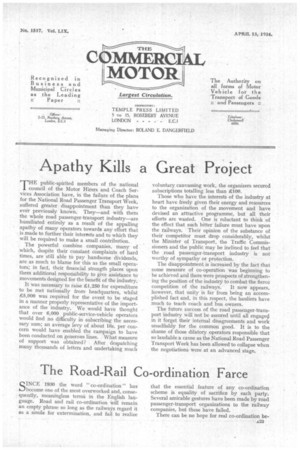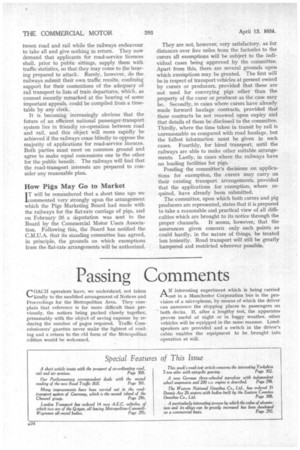The Road-Rail Co-ordination Farce
Page 25

Page 26

If you've noticed an error in this article please click here to report it so we can fix it.
SINCE 1930 the word " co-ordination " has become one of the most overworked and, consequently, meaningless terms in the English language. Road and rail co-ordination will remain an empty phrase so long as the railways regard it as a simile for extermination, and fail to realize that the essential feature of any co-ordination scheme is equality of sacrifice by each party. Several amicable gestures have been made by road passenger-transport organizations to the railway companies, but these have failed.
There can be no hope for real co-ordination be.A23 tween road and rail while the railways endeavour to take all and give nothing in return. They now demand that applicants for road-service licences shall, prior to public sittings, supply them with traffic statistics, so that they may come to the hearing prepared to attack. Rarely, however, do the railways submit their own traffic results, confining support for their contentions of the adequacy of rail transport to lists of train departures, which, as counsel recently remarked at the hearing of some important appeals, could be compiled from a timetable by any clerk.
It is becoming increasingly obvious that the future of an efficient national passenger-transport system lies in friendly co-operation between road and rail, and this object will more rapidly be achieved if the railways cease blindly to oppose the majority of applications for road-service licences. Both parties must meet on common ground and agree to make equal concessions one to the other for the public benefit. The railways will find that the road-transport interests are prepared to consider any reasonable plan.
How Pigs May Go to Market
IT will be remembered that a short time ago we commented very strongly upon the arrangement which the Pigs Marketing Board had made with the railways for the flat-rate carriage of pigs, and on February 26 a deputation was sent to the Board by the Commercial Motor Users Association. Following this, the Board has notified the C.M.U.A. that its standing committee has agreed, in principle, the grounds on which exemptions from the flat-rate arrangements will be authorized. They are not, however, very satisfactory, as for distances over five miles from the factories to the curers all exemptions will be subject to the individual cases being approved by the committee. Apart from this, there are several grounds upon which exemptions may be granted. The first will be in respect of transport vehicles at present owned by curers or producers, provided that these are not used for conveying pigs other than the property of the curer or producer as the case may be. Secondly, in cases where curers have already made forward haulage contracts, provided that these contracts be not renewed upon expiry and that details of them be disclosed to the committee. Thirdly, where the time taken in transit by rail is unreasonable as compared with road haulage, but the fullest information must be given in such cases. Fourthly, for hired transport, until the railways are able to make other suitable arrangements. Lastly, in cases where the railways have no loading facilities for pigs.
Pending the committee's decisions on applications for exemption, the curers may carry on their existing transport arrangements, provided that the applications for exemption, where required, have already been submitted.
The committee, upon which both curers and pig producers are represented, states that it is prepared to take a reasonable and practical view of all difficulties which are brought to its notice through the proper channels. It seems, however, that the assurances given concern only such points as could hardly, in the nature of things, be treated less leniently. Road transport will still be greatly hampered and restricted wherever possible.


























































































